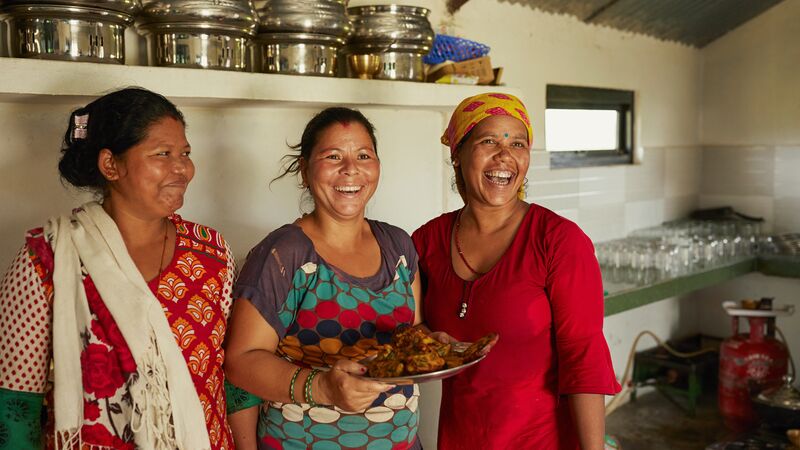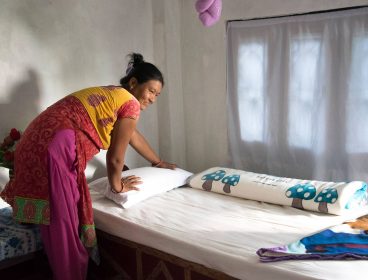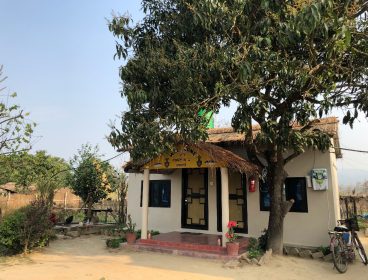
Community-based ecotourism venture in Nepal
56%
44%
Partner contribution
$ 190,000
DFAT contribution
$ 150,000
Total Value
$ 340,000
Start: August 2017 - End: April 2019
The Intrepid Group
The Intrepid Group is the world’s largest provider of adventure travel experiences. Over its 37 years of operation, the company has adhered to a socially and environmentally responsible ethos.

The World Wide Fund for Nature (WWF)
WWF is an international non-governmental organisation founded in 1961, working in the field of the wilderness preservation, and the reduction of humanity’s footprint on the environment.
This partnership supported the establishment of ecotourism homestays and experiences within the Madi Valley community, to establish unique wildlife programs within Chitwan National Park and commercial activities within the community (such as handicraft skills and culinary opportunities) that support higher rates of medium stay visitors.
Chitwan is a World Heritage Site and the second most popular tourist destination in Nepal. The current tourist products are short term and, despite their popularity, have limited positive impact for local communities. Ecotourism is not well established in Madi Valley and the partners propose to address this imbalance by growing community-based ecotourism options in the valley.
The partnership built on the area’s natural assets and expanded the opportunity for quality wildlife tourism which in turn, led to greater diversification from current tourism, predominantly trekking, in Nepal.
Intrepid provided funding, created the travel product in Madi Valley, selected appropriate suppliers/activities and provided training on safety and hygiene. Intrepid marketed and sold the trips through established marketing channels that reaches global audiences, guaranteeing almost immediate access to significant volume of visitors once infrastructure is in place.
WWF Nepal led the establishment of the ecotourism homestays, as it has done in other regions. The organisation has the technical skills necessary to establish an ecotourism venture, including governance and management procedures, community benefit sharing mechanisms, hospitality industry skills, business skills and mentoring relationships between homestays and larger private sector operators. WWF Australia acts as liaison between Intrepid and WWF Nepal.
Partnership Impact
“Around 13 of the 34 households are now operating guesthouses – one room with two beds, a fan, a mosquito net, and a little en-suite bathroom with a Western toilet and hot shower – with more on the way. Other households have been able to set up and run small shops, selling drinks and snacks to travellers as they pass through. Upgrades were made to the dining room and a new community hall was built. A new activities program was designed for guests, which included things like cycling excursions, fishing, cooking and farming. A cultural performance was introduced to tell the story of Madi Valley and how the Pun Magar ethnic group came to settle here.
Young men and women who’d left to find employment in the city were returning home to work with their families on new tourism opportunities.
The partnership benefitted non-homestay owners too. Roads were built, electricity was installed, a waste management system was implemented, and there was a decrease in human-wildlife conflict, thanks to a brand new fence built around the village to keep out curious creatures from Chitwan National Park. A fund was established to allow community members who may have lost crops or had property damaged by a wayward elephant to rebuild properties, replant crops, and start new businesses.
Women in the community are more empowered too. Before the village was established as a CBT, women generally stayed hidden behind the scenes, either working in the kitchen or collecting firewood from the forest.
‘Having now received comprehensive skills training in hospitality, management, and cooking, the women of Madi Valley now have the confidence to run their own guesthouse businesses,’ Myv says. ‘They’re generating their own income, and for the first time, feel empowered to decide how that money is spent.’
Photo © Matt Cherubino
Find out more about the impact in the Intrepid Blog Post and WWF film below:
Gender training with men and women can address societal norms and goes beyond how businesses usually engage with women and men. The Intrepid Group in Nepal provided gender training to households involved in setting up homestays for tourists. The aim was to encourage more equal sharing of household and business duties. This was in response to concerns that the homestays were adding to women’s workload. It is an example of ways businesses can engage beyond their usual scope and help to drive change.



